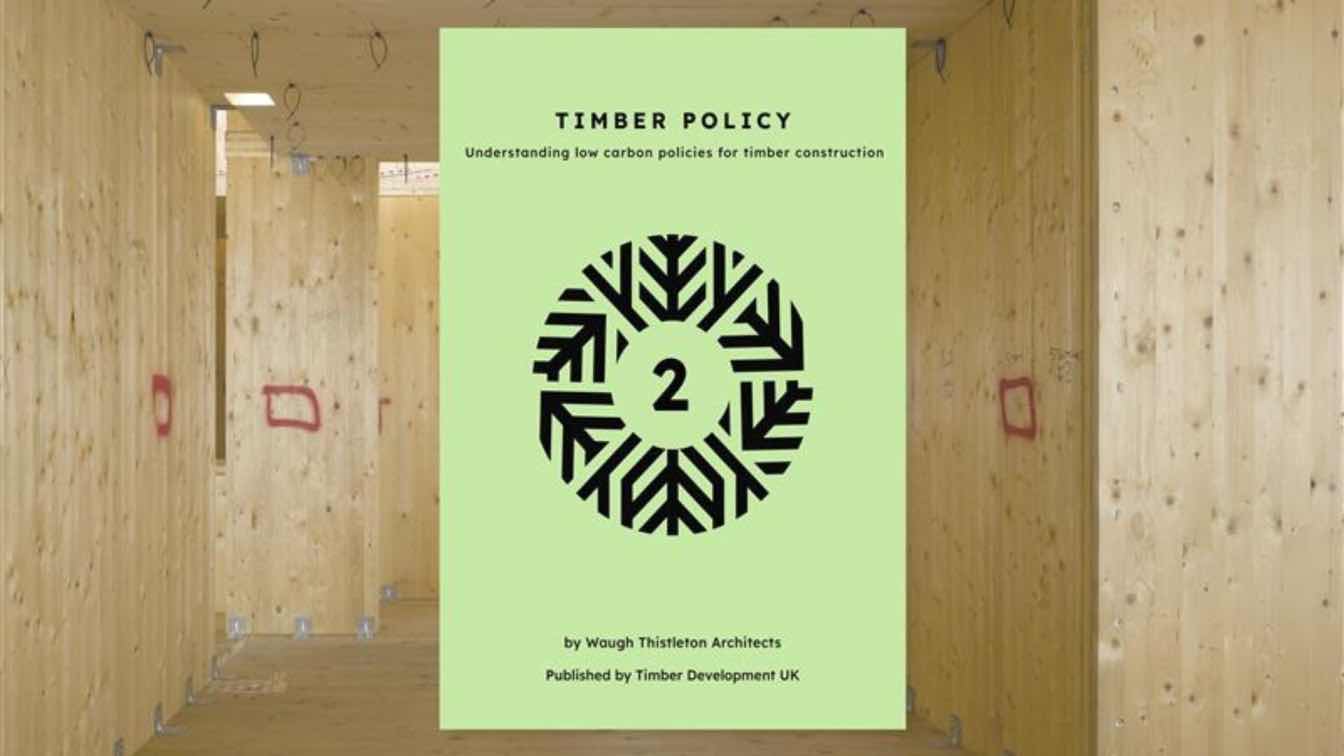Timber Development UK (TDUK) – the UK’s trade association for the timber supply chain – in collaboration with Waugh Thistleton Architects – have released a study on policies from across the globe which encourage the use of timber in construction.
Timber Policy is a comparative study of policies, across six countries, which can act as a powerful tool to support policy makers on their journey to decarbonise construction in the UK, and beyond.
Commissioned by TDUK and written by Waugh Thistleton Architects, this new report follows hot on the heels of the UK Government’s Timber in Construction (TiC) Roadmap, which aims to safely increase the use of timber in construction.
Timber is a low-carbon, natural, renewable material, at the heart of transitioning to a sustainable, circular economy for the UK and many nations around the world. This study is a snapshot of a rapidly evolving movement.
David Hopkins, chief executive of Timber Development UK said:
“What we need to see this year is ambition turned to action. This means forward looking policy – and politicians brave enough to create a framework which places value on low-carbon construction.
“Timber is the ultimate low-carbon material, and countries across the developed world have rightly recognized this – working to create comprehensive policy frameworks that support the growth of the timber industry.
“The UK Government’s roadmap is a fantastic starting point, but without more action, there is a risk the UK falls behind. We need a clear timeline for change, starting with limits on embodied carbon in buildings, which is currently unregulated.
“Embodied carbon can account for more than half of the emissions of a building over its lifetime - hundreds of thousands of tonnes of carbon per year - but this is currently ignored by UK politicians and policy makers.
“Our new book, commissioned by TDUK and written by Waugh Thistleton Architects, highlights the policies being put in place in a variety of countries around the world.
“The UK Government, if they are serious about achieving the goals of their roadmap, now need to look at what policies would work in the UK. We hope that these examples give food for thought and we can start to engage policy makers on making this happen, rather than simply relying on the market to change.
“This year we must turn pockets of excellence, like the Stirling Prize winning Goldsmith Street, the Phoenix Development in Lewes, or the pioneering Black & White Building from exceptions to the norm. The opportunity has never been greater.”
Andrew Waugh, director and co-founder, Waugh Thistleton Architects, said:
“As pioneers in timber construction, we are proud to collaborate with TDUK to author the Timber Policy Book. Working at the forefront of global timber construction and participating in extensive research with European partners, we understand first-hand the impact of government policies on sustainable, low-carbon construction.
“While the UK once led the world in mass timber construction, recent years have seen a shift in global leadership. Recent assessments, such as the Climate Change Committee's critique of the UK Government's Carbon Budget Delivery Plan, highlight the urgent need for accelerated policy development in the UK.
“While we commend initiatives like the Timber in Construction Roadmap, our research for Timber Policy reveals that current UK efforts fall short of addressing the urgency of the climate crisis. Bold leadership, as demonstrated by progressive nations such as France, Germany, The Netherlands and Denmark, mandating limits on embodied carbon and investing in sustainable timber projects, is essential for a meaningful transition to a low-carbon future. The Roadmap sets out timelines to consider options, encourage voluntary reporting, and seek advice, after which revisions to policy will be put in place. The Timber Policy Guide shows how this process has already happened in the six example countries and policies which have already been implemented.
“Despite challenges, some progress in the UK is evident; for example, the DfE's flagship project to standardise mass timber school fabrication underscores its commitment to innovation. Additionally, the Mass Timber Insurance Playbook and New Model Building Guides, funded by Built by Nature, a philanthropic organisation, provide invaluable resources for navigating the complexities of timber construction.
“The urgency of climate action cannot be overstated. With projections indicating a 1.5-degree increase in global temperatures by 2050 and up to 3 degrees by the end of the century, decisive steps must be taken. The Timber Policy book serves as a beacon of hope, illustrating how public-private partnerships can drive systemic change towards a sustainable future.”
Embodied carbon is recognised by major policy influencers such as the United Nations, Royal Society and World Green Building Council, and in the UK by the likes of the Climate Change Committee and Environmental Audit Committee as crucial to overcoming climate change.
Despite a wide array of evidence and calls from these bodies to implement key policies, such as the regulation of embodied carbon, there has been a highly variable policy approach across the world. The UK, once positioned as a leader in sustainable construction using timber, now lags behind many other nations due to its regulatory environment.
With this book, Timber Policy, we outline how six different countries around the world are helping to support the transition to low-carbon construction.
This is the second in a trio of essential books, with the first edition Timber Typologies providing clarity on different timber systems. The final book in the series, Timber LCA, will demystify lifetime carbon analysis for timber buildings.
Collectively, these books are intended to act as a stimulus for action – in the UK, and beyond.

The Black & White Building was recognized as a ‘pioneering achievement’ of timber construction in the Wood Awards 2023, where it was a double winner. Photographer: Jake Curtis.

Goldsmith Street is a timber frame schemed of 100 sustainable, community oriented socially rented homes for Norwich City Council, which won the RIBA Stirling Prize in 2019. Photographer: Tim Crocker.

The Phoenix is a proposed development of a 7.9 hectare brownfield site within the South Downs National Park, brought forward by Human Nature, a campaigning development company, working with some of the UK’s leading architects, designers and engineers.
Timber Development UK (Publisher)
Timber Development UK has been formed from the merger of the two largest and longest-established organisations in the supply chain, the Timber Trade Federation (TTF) and the Timber Research and Development Association (TRADA). Bringing these two associations together as one has created the largest, most comprehensive supply chain body in the UK, spanning from sawmill to specifier and all the points in between. TDUK aims to connect the timber supply chain, lead best practice, and accelerate a low carbon future.
Waugh Thistleton Architects (Author)
Waugh Thistleton is a world leader in engineered timber and a pioneer in the field of tall timber buildings. Since their inception they have prioritised the principles of reduce, reuse, recycle in their work, producing innovative and imaginative design solutions that harness leading technologies and minimise their impact on the environment. The quality of their buildings and commitment to low carbon construction has earned Waugh Thistleton an international reputation in environmentally viable architecture and design.





